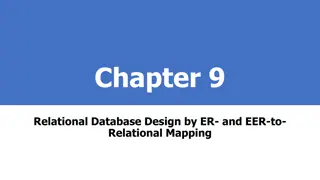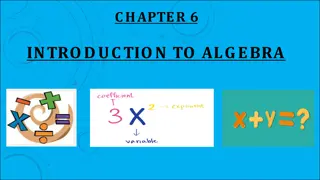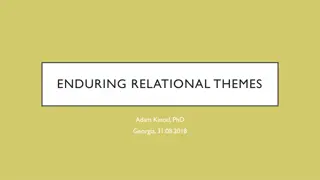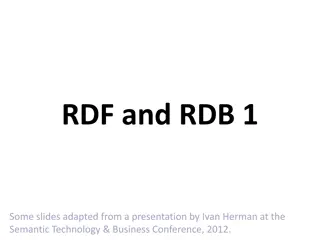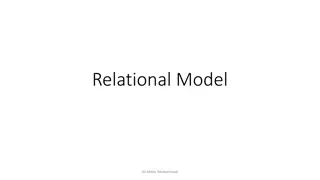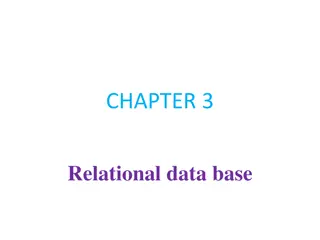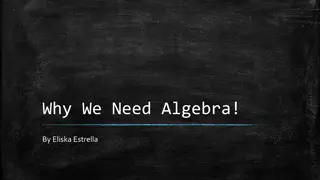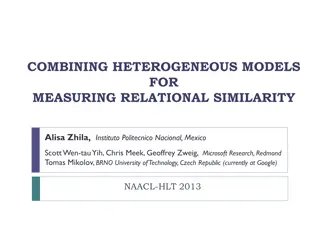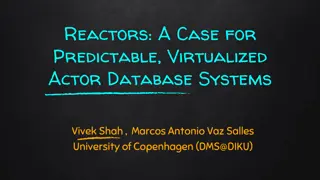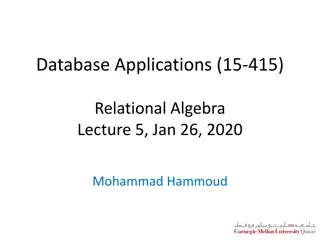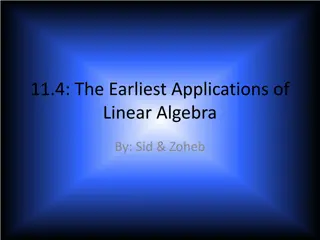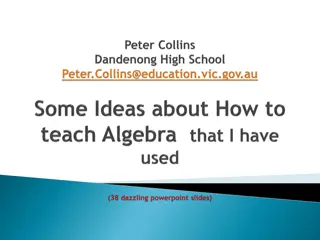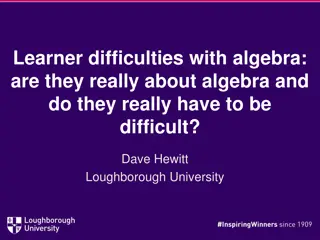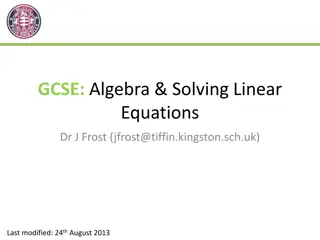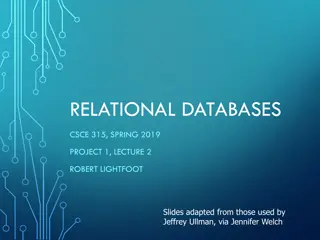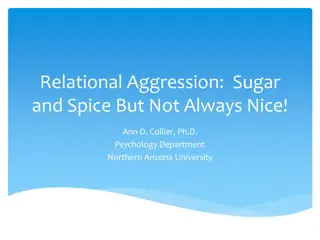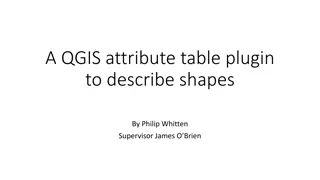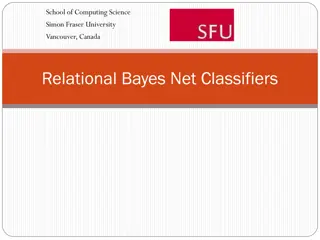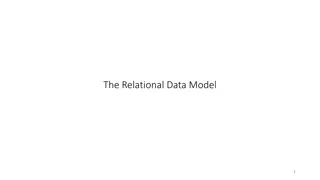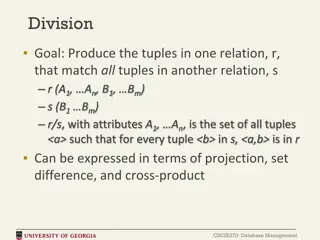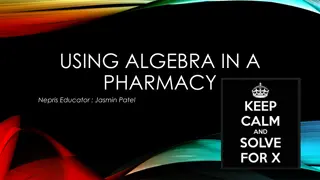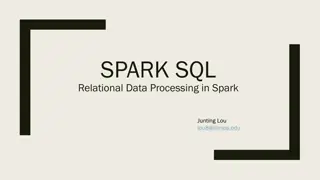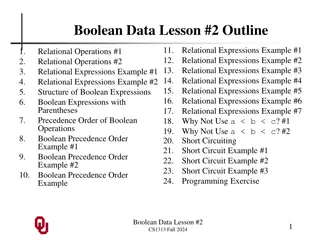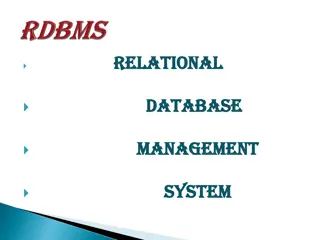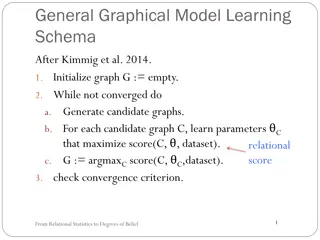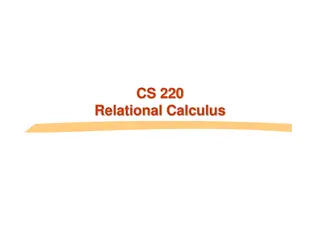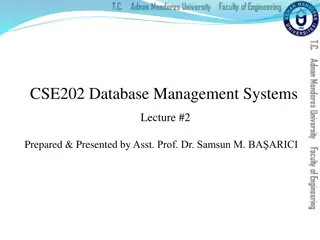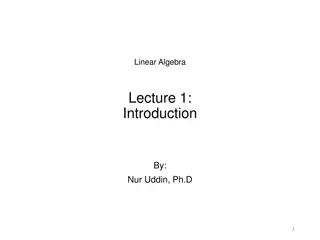Progressive Approach to Relational Entity Resolution
In this research paper authored by Yasser Altowim, Dmitri Kalashnikov, and Sharad Mehrotra, a progressive approach to relational entity resolution is presented. The study focuses on balancing cost and quality in entity resolution tasks for relational datasets. The goal is to develop a method that ac
1 views • 20 slides
Relational Database Design and Mapping Techniques
Explore the process of mapping Entity-Relationship (ER) and Enhanced Entity-Relationship (EER) models to relational databases. Learn about relational model concepts, mapping algorithms, and the goals and steps involved in the mapping process. Discover how to preserve information, maintain constraint
3 views • 42 slides
Introduction to Algebra: Understanding the Basics and History
Algebra, a fundamental branch of mathematics, uses letters and symbols to represent numbers and quantities in equations. This chapter covers the history of algebra, from its origins in ancient Egypt to its development by mathematicians like Al-Khwarizmi and Viète. Students will learn to work with a
5 views • 45 slides
University Math Placement Test Overview
The University Math Placement Test is a tool to help place students accurately into math courses, ensuring their success. It consists of three practice tests - Algebra, Trigonometry, and Precalculus. Students start with the Practice Algebra Test and have the opportunity to advance based on their sco
2 views • 13 slides
Diverse High School Courses at BMV: Algebra, Geometry, Biology, Debate, Spanish
Explore a variety of high school courses at BMV including Algebra 1 Honors, Geometry Honors, Biology Honors, Debate, and Spanish 1. These courses offer a comprehensive range of subjects from math to language arts, preparing students for advanced studies and fulfilling graduation requirements. Studen
0 views • 19 slides
Enduring Relational Themes in Psychotherapy
Exploring the concept of Enduring Relational Themes (ERTs) in psychotherapy, this content delves into the history of transference in Gestalt therapy, contemporary psychoanalysis perspectives, forms of transference, and Lynne Jacobs' insights. It highlights how ERTs manifest, their impact on therapy,
6 views • 9 slides
Exporting Relational Data to RDF: Strategies and Considerations
Explore the process of mapping relational data to RDF, including the choice of RDF vocabulary, defining mapping techniques, and exporting strategies. Learn about RDB systems that support RDF, direct mapping approaches, and the use of hybrid storage solutions. Discover how to bridge SPARQL and SQL fo
4 views • 13 slides
The Key Concepts of Relational Databases
Introduction to the fundamental concepts of relational databases including the relational model proposed by Edgar F. Codd, relation schemes, relation instances, keys for a relation, and more. Discover the significance of keys, candidate keys, superkeys, and primary keys in database design.
0 views • 27 slides
Relational Databases and File-Based Systems
This chapter delves into the fundamental concepts of databases, comparing them to file-based systems, and highlighting the significance of relational databases in modern integrated AISs. It explores the difference between logical and physical views of databases, introduces key concepts such as DBMS
1 views • 70 slides
Boolean Algebra: Canonical Normal Form, Minterms, and Maxterms Explained
Boolean algebra concepts including Canonical Normal Form, Minterms, and Maxterms are discussed in detail, along with examples and truth table representations. The Consensus Theorem and Redundant Theorem of Boolean Algebra are also explained, highlighting simplification techniques for Boolean express
0 views • 5 slides
The Importance of Algebra in Everyday Life
Algebra plays a crucial role in various professions and daily activities such as shopping, budgeting, and problem-solving. It is essential for jobs in fields like farming, construction, animation, computer science, and more. Utilizing algebraic formulas can help in practical scenarios, like determin
1 views • 17 slides
Enhancing Relational Similarity Measurements: A Model Combination Approach
This study explores combining heterogeneous models for measuring relational similarity, showcasing the importance of general relational similarity models. It discusses the degrees of relational similarity and introduces a directional similarity model that outperforms previous systems. The approach l
0 views • 23 slides
Reactor: A Case for Predictable, Virtualized Actor Database Systems
Exploring the integration of actor programming models in modern relational databases to achieve high performance. The focus is on addressing challenges related to stored procedures, data partitioning, modularity, isolation, software engineering, and performance. The talk outlines motivation, the rel
0 views • 41 slides
Relational Query Languages in Database Applications
In this lecture, Mohammad Hammoud discusses the importance of relational query languages (QLs) in manipulating and retrieving data in databases. He covers the strong formal foundation of QLs, their distinction from programming languages, and their effectiveness for accessing large datasets. The sess
0 views • 39 slides
Challenges and Innovations in Relational Engine Algorithms
Exploring the complexity of processing graph data in relational query engines, this content delves into the challenges faced, practices adopted in academia, and innovative solutions like LMS-NPRR, trie join, and specialized data structures. It discusses the difficulties in handling acyclic vs. cycli
0 views • 27 slides
Challenges in Motivating Students to Study Algebra: Insights from Surveys and Recommendations
Teachers face challenges in motivating students to study Algebra, as highlighted by survey findings. The most significant issues include working with unmotivated students, making mathematics accessible, and poor background preparation in certain topics. Recommendations focus on key topics of school
0 views • 13 slides
The Oldest Applications of Linear Algebra in Ancient Civilizations
Linear algebra has roots in ancient civilizations like Egypt, where mathematical problems related to land measurement, resource distribution, and taxation were solved using techniques like Gaussian elimination and Cramer's Rule. The Rhind Papyrus from 1650 B.C. contains examples of linear systems an
0 views • 30 slides
Enhancing Algebra Teaching Strategies for Educators
Dive into a comprehensive resource on effective algebra teaching methods, including tips on simplification, substitution, linear equation solving, and more. Discover the importance of proper algebra techniques and how to make the learning process more engaging for students. Explore the evolution of
0 views • 38 slides
The World of Algebra: Introduction, Uses, and Importance
Algebra is a fundamental branch of mathematics that involves solving equations with unknown variables. This post covers the definition of algebra, its significance in real life, the Father of Algebra – al-Khwarizmi, reasons for studying algebra, and practical applications like time management and
0 views • 8 slides
Difficulties with Algebra: Insights and Solutions
Exploring common challenges students face in algebra, including misconceptions with the equals sign, process-object dichotomy, and formal notation. Discover how operational, relational, and substitutive understandings can enhance equation-solving skills. Insights from research shed light on overcomi
0 views • 46 slides
GCSE Algebra Revision Materials and Equations Practice
Explore a collection of GCSE algebra revision materials, including solving linear equations and common mishaps in algebraic simplification. Practice setting up equations and solving linear equations with provided examples and questions. Enhance your algebra skills through comprehensive content desig
0 views • 15 slides
Relational Evangelism and Sharing Your Faith Testimony
Discover the essence of relational evangelism and effectively articulating your testimony of faith. Explore the significance of the Gospel message and different evangelistic approaches while delving into the concept of personal evangelism without imposition. Embrace the idea of faith arising in vari
0 views • 32 slides
Fundamentals of Relational Databases in CSCE 315 - Lecture Highlights
Introduction to relational databases covering topics such as relational data model, schemas, converting from entity-relationship model, entity sets, relations, relationships, combining relations, and practical examples. Learn about storing data in tables, attributes, database organization, and the i
1 views • 18 slides
Relational Aggression in Girls: The Impact on Social Relationships
Relational aggression, a form of social bullying, can have detrimental effects on girls' social relationships and self-esteem. This type of indirect aggression includes behaviors like exclusion, spreading rumors, and social manipulation. Understanding and assessing relational aggression is crucial f
0 views • 22 slides
Enhancing Spatial Data Analysis in QGIS
Explore the integration of relational databases with QGIS to facilitate efficient spatial data analysis. Discover the importance of recognizing spatial relationships within data sets and the solutions to enhance QGIS for relational datasets. Overcome challenges and delve into the intersection and su
0 views • 25 slides
Relational Bayesian Networks in Statistical Inference
Relational Bayesian networks play a crucial role in predicting ground facts and frequencies in complex relational data. Through first-order and ground probabilities, these networks provide insights into individual cases and categories. Learning Bayesian networks for such data involves exploring diff
0 views • 46 slides
The Relational Data Model and Database Concepts
Delve into the world of relational data modeling, database integrity rules, and structure. Explore how a university database in MS Access utilizes relational tables and fields to store information. Learn about the key terminology associated with relational databases, such as primary keys, foreign ke
0 views • 69 slides
Women's Self-Esteem and Relationship Behavior Study: Insights and Implications
This study explores the relationship between women's self-esteem, relational behavior, and perceptions of relational desirability. Findings indicate that self-esteem does not significantly predict relational behavior, with women feeling less desirable than their partners reported investing more in r
0 views • 9 slides
Relational Child and Adolescent Psychotherapy
Explore the concepts of relational child and adolescent psychotherapy involving attachment patterns, intersubjectivity, corrective emotional experiences, and the role of the relational psychodynamic psychotherapist in providing corrective emotional experiences essential for the child's development.
0 views • 25 slides
Division in Relational Algebra
Division in relational algebra is a fundamental operation used to produce tuples in one relation that match all tuples in another relation based on certain conditions. It involves expressing the desired result in terms of projection, set difference, and cross-product operations. The process ensures
0 views • 13 slides
Algebra Application in Pharmacy: Solving Two-Step Equations
Pharmacists indeed use algebra in their profession, involving basic algebra, fractions, percentages, and ratios to ensure accurate dosage calculations for medications. Solving for unknown variables in two-step equations is beneficial for pharmacists, as demonstrated in real-life scenarios like deter
0 views • 39 slides
Overview of Spark SQL: A Revolutionary Approach to Relational Data Processing
Spark SQL revolutionized relational data processing by tightly integrating relational and procedural paradigms through its declarative DataFrame API. It introduced the Catalyst optimizer, making it easier to add data sources and optimization rules. Previous attempts with MapReduce, Pig, Hive, and Dr
0 views • 29 slides
Relational Operations for Boolean Expressions
Learn about relational operations in Boolean expressions through examples and explanations. Discover how to compare numeric operands to produce Boolean results, covering equal to, not equal to, less than, less than or equal to, greater than, and greater than or equal to operations. The content inclu
0 views • 25 slides
Evolution of Database Management Systems
The evolution of Database Management Systems (DBMS) began with file systems and punched cards in the 1950s, followed by hierarchical and network models in the 1960s and 1970s. The 1980s introduced relational databases like Ingres, Oracle, DB2, and Sybase. The 1990s saw the rise of object-oriented an
0 views • 31 slides
Learning Bayesian Network Models from Complex Relational Data
Delve into the process of learning Bayesian network models from complex relational data, extending traditional algorithms to suit relational data structures. Explore key concepts like likelihood functions, graphical model initialization, and parameter learning for effective model fitting.
0 views • 20 slides
Introduction to Relational Calculus and Algebra in Database Management
Explore the fundamental concepts of relational calculus and algebra in the domain of database management. Understand the differences between declarative and imperative query languages and learn to retrieve information using practical examples and theoretical frameworks such as tuple relational calcu
0 views • 23 slides
CSE202 Database Management Systems
The basics of relational algebra and calculus in database management, covering unary and binary relational operations, query examples, tuple and domain relational calculus. Explore the set of operations and declarative language used for specifying relational queries.
0 views • 45 slides
Query Processing in Relational Algebra: Transforming, Estimating Costs, and Generating Plans
This content delves into the intricacies of query processing at the relational algebra level. It covers transformations, estimation of costs, detailed query plan generation, and plan comparison. The process involves estimating the cost and size of query plans, calculating the number of IO operations
0 views • 20 slides
Introduction to Linear Algebra: Syllabus, Examples, and Solutions
Delve into the fundamentals of linear algebra through a series of lectures and examples by Nur Uddin, Ph.D. Explore the application of linear algebra in daily life scenarios, solving linear equations and systems, matrices multiplication, and more. Understand the concept of linear systems, solutions,
0 views • 24 slides
E-COMMERCE
A relational database is a collection of data items organized in tables for efficient data access. Explore the connection between e-commerce and relational databases, including essential tools, required knowledge, and deliverables. Learn how to build and manage e-commerce websites, payment transacti
0 views • 7 slides

